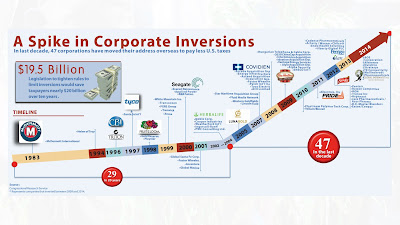The Greek economy, as
most people know, is at its worst condition for the last 7 – 8 years due to a
recession, its huge amount of debt, lack of liquidity due to wage and pension
cuts, unemployment and taxes. Under the memorandum Greece signed last summer,
it agreed to meet some criteria in order to avoid an exit from the Eurozone. I
am not going into further details, but the pending agreement, still pending, is
taxes, taxes and taxes. The middle class is being eroded, not to speak about
the lower income class.
Since Greece entered into
this never ending loop, government officials talk about investments. But for
investments to take place, a serious and credible nation must have a stable tax
code, for its citizens as well as for attracting investments. And the Greek
government is bragging about investments. But if you do not have a stable and
acceptable tax system, as well as a manageable debt, investments will not reach
the horizon.
Corporate Inversion is used
by corporation by relocating to a foreign country having a lower tax laws. As a
result, the operating body of the company remains unchanged, its legal
headquarters change, as is its tax obligation. Many companies have relocated
their headquarters to benefit from saving taxes. A case in point is Bulgaria
and Cyprus, where many companies are relocating. Recently, Greek ship owners
announced that they would relocate to Cyprus since their tax rate is at 12%.
The benefits of corporate
inversion is that by changing its legal headquarters to a foreign location, it
is no longer required to be subject under the tax code on foreign earnings. It
is subject to pay taxes on earnings earned on is base country. The other
benefit is that being a multinational, it is able to make a loan to its
subsidiary back home. This process is called earnings stripping. According to
Investopedia, this is a common practice used my multinationals to escape high
taxes at home. So is there an insane investor who will come to Greece and
invest in such a climate of uncertainty and high taxation?
The multinational company
will make a loan to its subsidiary back home, and the subsidiary will take
advantage of the tax deduction of interest payments. The deduction in earnings
will have a domino effect to the overall earnings since interest payments in
the US, for example, are tax deductible.
The consequences of these
somewhat unethical practices, is that capital is fleeing the country. It is not
due only to economic instability but political or currency risk, or even in
situations where capital controls are being imposed. All three were the cause
for a mass of capital exodus from the Greek banks in the summer of 2015, which
led to capital controls, and the closing of Greek banks. Capital controls are
still in effect.
Some interesting data facts are presented here below:
According to Wikipedia,
it is interesting to read the history of capital flights where in the 1990’s it
was observed in the Asian and Latin American countries. Examples were Argentina
in 2001, on the fears that the country would default. Another interesting case
was in 2006 in France (irony) when the government announced that it would
impose a wealth tax. In 2012, the Spanish central bank announced that in Q1
2012 there was an exodus flow of capital in the amount of 97 billion euros
(influenced by the Greek crisis).
Bill T. Alexandratos



